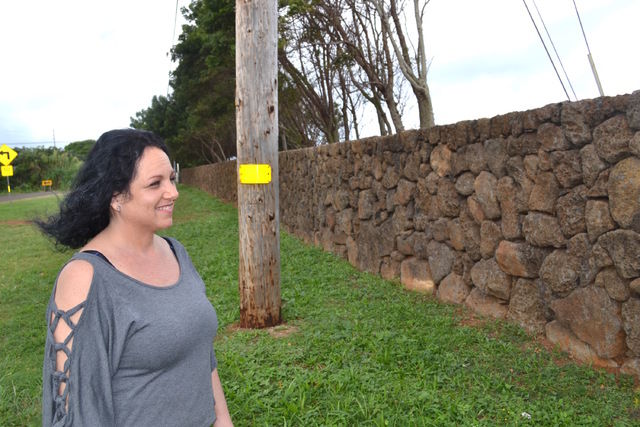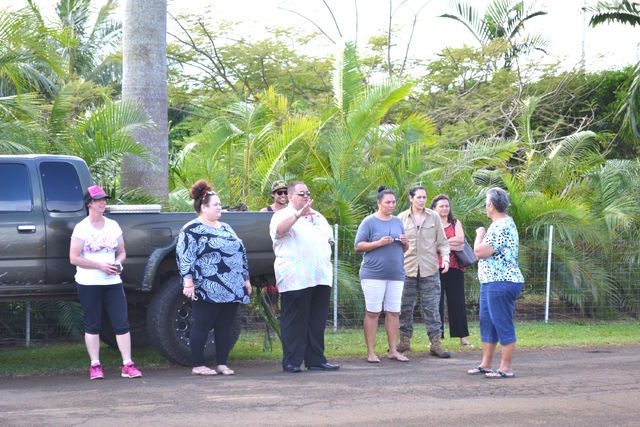KILAUEA — Ku‘ulei Cummings’s son Ezra plays along a five-foot tall wall that extends down Koolau Road in Kilauea.
Cummings talks story with family members as others play with her baby boy. Beyond the wall is access to resources and lands precious to Cummings and her family.
The Wailua resident was among eight people who told the media Tuesday of their desire to keep kuleana land that lies on a 700-acre property owned by Mark Zuckerberg.
“My oldest children have gone and been able to go to the beach and dive and fish and gather,” Cummings said. “To have my children lose that and their children never have the opportunity, that’s what bothers me.”
The eight are descendants of Manuel Rapozo. Rapozo owned four parcels, amounting to over two acres, in 1894. During his life, Rapozo leased those properties to Kilauea Sugar Plantation, according to his descendants.
Pilaa International LLC, Northshore Kalo LLC and High Flyer LLC — three companies owned by Facebook founder Zuckerberg — have filed eight quiet title and partition lawsuits in state Circuit Court on Dec. 30 involving over 100 people who have some claim to kuleana land on Zuckerberg’s property, according to court records.
Kuleana lands are parcels granted to Native Hawaiian tenant farmers between 1850 and 1855, according to the “Ua koe ke kuleana o na kanaka.” The land is inherited by descendants of the initial buyer with or without them knowing.
In a statement to the Garden Island, Zuckerberg said he and his wife are reconsidering the quiet title process based on feedback from the local community.
“We want to make sure we are following a process that protects the interests of property owners, respects the traditions of native Hawaiians and preserves the environment,” he wrote.
Terra Kimura of Kilauea is a great-great-great granddaughter of Rapozo.
“I grew up here. I grew up on these lands,” she said. “ I went camping down at Pilaa Beach, fishing, diving, camping, ride horses, raise cattle. It has a more personal tone for me. I did know that my family had land here.”
Having access to her land is most the important thing for her.
“This is the wall that’s meant to keep us all out. I miss being able to visit places I once was able to visit as a kid,” she said. “I think the access to land, especially after hundreds of years of having it taken, is important to stand here and fight for that access and that right.”
She would like Zuckerberg to work with the community, but she hasn’t personally seen community outreach from him on the Garden Isle.
“Yes, he did provide money to the town of Kilauea, but community outreach is more than just giving away money,” she said. “Quiet title is a legal form of stealing. You’ve taken local people to court. Dropping the case would be the best option. You’ve summoned the people. They don’t have to sell. They have those rights.”
Keola Worthington, a genealogist who has researched land titles and is a kuleana landowner, said Zuckerberg needs to hooponopono or come together with heirs.
“It’s getting all these issues and problems and making one solution and agreement,” he said. “Going to the courts is a forceful way. Without your knowledge, who cares who you are? I’m going to do what I want to do.”
Thousands of people may be entitled to land on the property.
“Kuleana in translation means responsibility. The individuals was made to malama the land in perpetuity,” he said. “All lineal heirs, forever and eternity, have an undivided interest. It also means heirs that are not even born.”
Zuckerberg, who purchased the land for about $100 million in 2014, said he and his family love Kauai.
“We want to be good members of the community and preserve the land for generations to come,” he wrote in a statement.
State Rep. Kaniela Ing said he was heartened to hear that Zuckerberg is reconsidering his lawsuits against the indigenous kuleana land owners.
“This shows the power that everyday people yield when we band together to protect indigenous families and our ‘aina,” Ing said in a press release. “The people’s voice can and will overcome big money and celebrity — even against the fifth richest man in the world.”
Ing thanked Zuckerberg for his words, but also said he would be seeing the case through to the end.
“In the meantime, let’s all maintain aloha and give him a chance to meet his promise to talk story, explain his intentions, and make right with the community,” Ing said. “We will be here watching and willing to share our mana’o.”
Shannon Buckner, an heir to Rapozo, said she’s entitled to a three-foot by three-foot plot of kuleana land. She found out about her claim last month.
“I got a call from a lawyer (representing Zuckerberg), saying I was an heir and I can sell for $500 or I can be summoned to go to court and basically our land would be auctioned from there,” she said.
Buckner was caught off guard.
“I was upset because I didn’t have a chance for myself to grasp the fact that I even owned the land,” she said.
Now that she knows, she isn’t selling.
“He can’t take this. It means too much now,” she said. “If anything came good out of this, I got to learn I have a huge family I got to know.”




